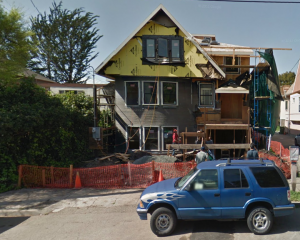South side bears brunt of the problem
According to a city staff report from July 2012, the south side area near the Cal campus bears much of the brunt of this problem, due to landlords catering to students who want to live close to campus. The Southside Neighborhood Consortium — the umbrella organization for six neighborhood groups in the area — wrote a memo asking the city to deal with mini-dorms in January 2012. According to the group, there are “at least a couple of dozen properties that have become mini-dorms over the last few years.”
In a typical situation, according to the group, an investor purchases an existing unit with, say, three bedrooms. The owner then adds bedrooms to the property without adding any additional common space or parking, then markets the property to students. One resident who spoke last week said an estimated 12-14 students may live in one of these homes at any given time.
 “The typical outcome of these conversions is, effectively, a ‘party house’ that generates unacceptable levels of noise, trash, poorly maintained yards and structures, greater numbers of cars requiring parking, and late-night traffic,” according to the memo. “Owners of mini-dorms generally are unresponsive to requests to manage their properties in a manner that would reduce negative impacts because of the revenue that would be lost by lowering density or by enforcing ‘no party’ clauses in leases, etc.”
“The typical outcome of these conversions is, effectively, a ‘party house’ that generates unacceptable levels of noise, trash, poorly maintained yards and structures, greater numbers of cars requiring parking, and late-night traffic,” according to the memo. “Owners of mini-dorms generally are unresponsive to requests to manage their properties in a manner that would reduce negative impacts because of the revenue that would be lost by lowering density or by enforcing ‘no party’ clauses in leases, etc.”
‘Cycle of neighborhood degradation’
These mini-dorms, according to the memo, lead to “a vicious cycle of neighborhood degradation” as residents move out due to the problems posed by mini-dorms, and investors then snatch up the properties to convert them into more mini-dorms: “In this way, long-term homeowners and tenants are displaced with a transient population that tends to view the Berkeley community as a place to ‘party’ in an irresponsible manner.”
Last Tuesday night, July 16, the council voted to ask the city’s Planning Commission to develop an ordinance designed to regulate mini-dorms. The ordinance would control the addition of bedrooms in some residential zones, and may be modeled on a related ordinance in San Luis Obispo. Council also asked the commission to consider creating an “overlay district,” which could limit the regulations to a certain area, such as south of campus, rather than having it apply city-wide.
The ordinance would apply only to new construction, and would require a use permit with a public hearing for the addition of a sixth bedroom or more. It would not apply to other types of group housing — such as fraternities and sororities, dorms or rooming houses — which are defined differently under the city code.
Council has several policies in contention
Councilwoman Susan Wengraf noted that the new limitation seemed to be somewhat in opposition to a recent council decision to allow property owners to build additional in-law type units on their property with fewer administrative hurdles. That would ultimately mean, once the mini-dorm ordinance is final, that adding a sixth bedroom would require more review — including fees of an estimated $5,000 — than construction of a detached in-law unit.
Replied city attorney Zach Cowan: “The council has various policies that are in contention with each other, and that’s just another one. ”
Councilman Jesse Arreguín said ultimately the city needs to improve enforcement of its ordinances to ensure that problems associated with mini-dorms are kept to a minimum: “What it really comes down to is enforcing the existing law and whatever new policy we adopt.”
In response to concerns expressed by Councilman Laurie Capitelli that the new ordinance wouldn’t solve all the problems noted by residents, Councilman Kriss Worthington said that, at least, it’s a start.
“I do agree it won’t work for all of the people all of the time,” said Worthington. “We’re not proposing this as a panacea to solve all the problems. This is just one tool that’s proposed for us to move forward.”
